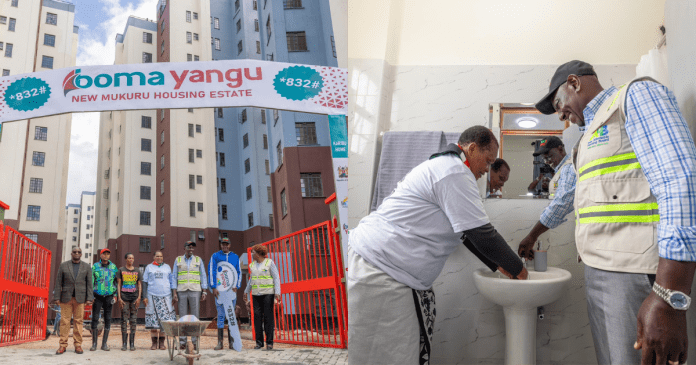Housing Principal Secretary Charles Hinga has announced that new homeowners in Mukuru slums, who recently received house keys from President William Ruto, will be issued sectional title deeds.
Speaking a day after Ruto launched the first batch of social housing units under the Kenya Kwanza administration, Hinga described the initiative as a transformative project that will gradually eliminate slums while dignifying the lives of residents.
“Shameful!” Kenyan criticizes Ruto for giving bedsitter to Mukuru family woman
“The event yesterday was the first housing units that have begun under this administration, that we handed over the keys to the beneficiaries. And the beneficiaries in this case are the communities living in the larger Mukuru area,” Hinga said on Citizen TV where he was hosted by Jeff Koinange.
The first group of occupants mainly came from two settlements: Riyara village, also known as Kijiji, and Marigwini. These areas sit on government land, and resettlement began there before expanding to other parts of Mukuru, which is unique in having both public and private land ownership.
“We enumerated residents house by house, gathered data, and then invited them to register voluntarily. Based on income, they chose their preferred typology, bed-sitters, one-bedrooms, or two-bedrooms,” Hinga explained.
The units handed over this week were predominantly bed-sitters, with over 5,000 completed so far. One- and two-bedroom units are still under construction and expected to be ready by the first quarter of next year.
Ni Wewe tuu huna pesa: Kenyans share jaw-dropping account balances
No forced evictions, only structured transition
Participation in the program is voluntary, Hinga emphasized, debunking fears of displacement.
“There is no forced eviction. People receive facilitation and move voluntarily, a process seen in other settlements like Kibra. Ultimately, all residents do take the offer.”
Residents moving into these new homes are required to pay Sh 2,800 per month under a rent-to-own model. Unlike conventional rent, these monthly payments build toward ownership.
“Many people have worked in this city for years and retired to the village without owning anything. This program ensures they stop paying for informal housing with no basic amenities and start owning decent homes,” Hinga said.
On top of this, residents receive essential services such as water, electricity, and piped cooking gas. While a service charge of Sh 3,000 is standard, a government subsidy of Sh 2,000 reduces the burden for vulnerable families. Residents also contribute Sh 200 monthly for insurance to secure tenure in unforeseen circumstances.
Eliminating the “penalty of poverty”
Hinga called the program more than just a housing project. It’s a full-on assault on urban inequality and the systemic costs of poverty.
“A study in Mukuru showed that the poorest people pay up to 172% more for water and 140% more for electricity due to vendors and illegal connections. Many still pay to use toilets, while others resort to kasuku tins at night. This is where flying toilets come from,” he said.
He continued:
“These are the lowest forms of indignity, yet that’s the reality for nearly 70% of urban Kenyans. At its core, this project is about dignifying people.”
The newly constructed Mukuru estate now boasts modern infrastructure that mirrors high-end living. There is piped water, prepaid electricity meters, and piped gas. Residents can even buy gas worth just Sh 10 for small tasks like boiling tea.
Internet connectivity has also been declared a basic right, with fiber-to-home connections offering speeds of over 70 Mbps, IPTV services with 70 channels at Sh 10 per day, and internet-based calling options.
The development also includes social infrastructure, ECD classrooms, a primary and junior secondary school, a secondary school under construction, a health center, and a strip mall. Safety features include CCTV surveillance, a fire station, and estate managers who help residents adjust to their new lifestyle.
From slum dwellers to homeowners
A major mindset shift is underway as residents transition from being informal tenants to legal property owners.
“We’re guiding people through change management. This is not just about living in better homes, it’s about instilling pride and responsibility. They are homeowners now, and they understand that these assets can help them build equity or access loans,” Hinga said.
All homeowners will receive sectional title deeds in line with the Sectional Properties Act, solidifying their legal claim to the homes.
“Owning a home gives people a stake in the nation. They stop feeling left out and start seeing themselves as part of the country’s progress,” he added.
Slum eradication through incremental construction
The larger goal, Hinga noted, is to systematically eliminate slums through continuous construction and relocation. Once residents vacate dilapidated structures, contractors will move in to build new units on the same sites.
The Mukuru project is part of a broader initiative targeting settlements in Kibra, Mathare, and other informal areas. The plan combines social housing with affordable and market-rate housing under the following categories:
Social housing: For those earning Sh 20,000 and below.
Affordable housing: For those earning Sh 20,000 to Sh 150,000.
Market housing: For incomes above Sh 150,000.
The allocation formula is 20% social, 50% affordable, and 30% market housing. Under a “one house, one ID” rule, each Kenyan is entitled to only one home under the program.
Progress, challenges, and looking ahead
So far, 148,000 housing units are under construction. Hinga acknowledged that while ambitious housing targets have been set before, including 500,000 homes under Jubilee and the Soweto A project under NARC, they often fell short due to financing challenges.
“We didn’t lack effort. What we lacked was a viable financing mechanism. Under this administration, the target is 250,000 homes a year. Though delays occurred initially due to court cases and legal frameworks, we’ve stabilized the pipeline since March last year. Now, we are moving forward,” Hinga declared.









